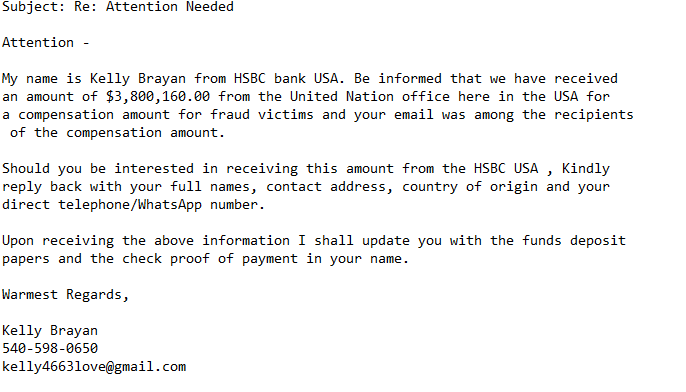Remove “HSBC Fraud Victim Compensation” email
The “HSBC Fraud Victim Compensation” email falls into the scam email category. The email falsely informs users that they are eligible to receive compensation for being a fraud victim. The email claims that the United Nations has granted HSBC Bank $3.8 million to be distributed to fraud victims. Those interested in receiving the compensation are asked to reply with their personal information. The email contents are entirely fake. This is merely an attempt to phish users’ personal information and potentially scam money. The email is not dangerous as long as you do not interact with it.
Emails of this kind are often distributed on a massive scale to thousands of compromised email addresses. They typically make absurd claims, suggesting that recipients have won a lottery, inherited a fortune, or, in this instance, are entitled to receive compensation for having been victims of fraud. According to this email, this compensation comes from the United Nations through HSBC Bank in the U.S., with a total of around $3.8 million set aside for fraud victims. The email asks that those interested in receiving the compensation reply to the email with their full name, contact address, country of origin, and phone number.
If you reply and continue engaging with the scammers, they will gradually request more and more information. They often attempt to build trust with the recipient to make them easier to influence later. After enough back-and-forth, when they feel some trust has been established, scammers may even ask for money, often providing vague and illogical explanations that victims might overlook due to this newfound trust and the promises of money.
When scammers collect personal information, they can either exploit it for their other scams or sell it on hacker forums to other criminals. Sensitive data such as names, addresses, and phone numbers can significantly heighten the chances of success in future scams. Victims are considerably more likely to fall victim to a scam if they are addressed by name or if their personal details are mentioned. Furthermore, if scammers succeed in obtaining credit card information, they may conduct unauthorized transactions.
As a general rule, any email that promises substantial amounts of money is always a scam, without exception. If something appears too good to be true, that is because it is. This “HSBC Fraud Victim Compensation” email is certainly unconvincing, but scammers frequently target older people who may be less aware of such scams and, as a result, more susceptible to falling for them. Unfortunately, it’s not unusual for people to lose tens of thousands of dollars to these types of scams.
The full “HSBC Fraud Victim Compensation” email is below:
Subject: Re: Attention Needed
Attention –
My name is Kelly Brayan from HSBC bank USA. Be informed that we have received an amount of $3,800,160.00 from the United Nation office here in the USA for a compensation amount for fraud victims and your email was among the recipients of the compensation amount.
Should you be interested in receiving this amount from the HSBC USA , Kindly reply back with your full names, contact address, country of origin and your direct telephone/WhatsApp number.
Upon receiving the above information I shall update you with the funds deposit papers and the check proof of payment in your name.
Warmest Regards,
Kelly Brayan
540-598-0650
kelly4663love@gmail.com
Remove “HSBC Fraud Victim Compensation” email
It’s important to understand why you might be receiving scam emails. If you’re receiving these types of emails in your inbox, it likely means that your email address has been leaked. This is a common occurrence, as many platforms don’t have strong security measures and are often targeted by cybercriminals. When personal information like your email address is leaked or stolen, it can end up on hacker forums, where it is sold for malicious use. You can check if your email address has been compromised on haveibeenpwned. While you can’t prevent your email address from being leaked, you can be more vigilant with unsolicited contact if you know that malicious actors have your email address.
If you come across this “HSBC Fraud Victim Compensation” email, it’s best to delete it without reading further. If you’ve already interacted with the email and shared any personal details, be very cautious with any unsolicited contacts, whether via email or phone, even if the caller seems to know relevant information about you.
Site Disclaimer
WiperSoft.com is not sponsored, affiliated, linked to or owned by malware developers or distributors that are referred to in this article. The article does NOT endorse or promote malicious programs. The intention behind it is to present useful information that will help users to detect and eliminate malware from their computer by using WiperSoft and/or the manual removal guide.
The article should only be used for educational purposes. If you follow the instructions provided in the article, you agree to be bound by this disclaimer. We do not guarantee that the article will aid you in completely removing the malware from your PC. Malicious programs are constantly developing, which is why it is not always easy or possible to clean the computer by using only the manual removal guide.

